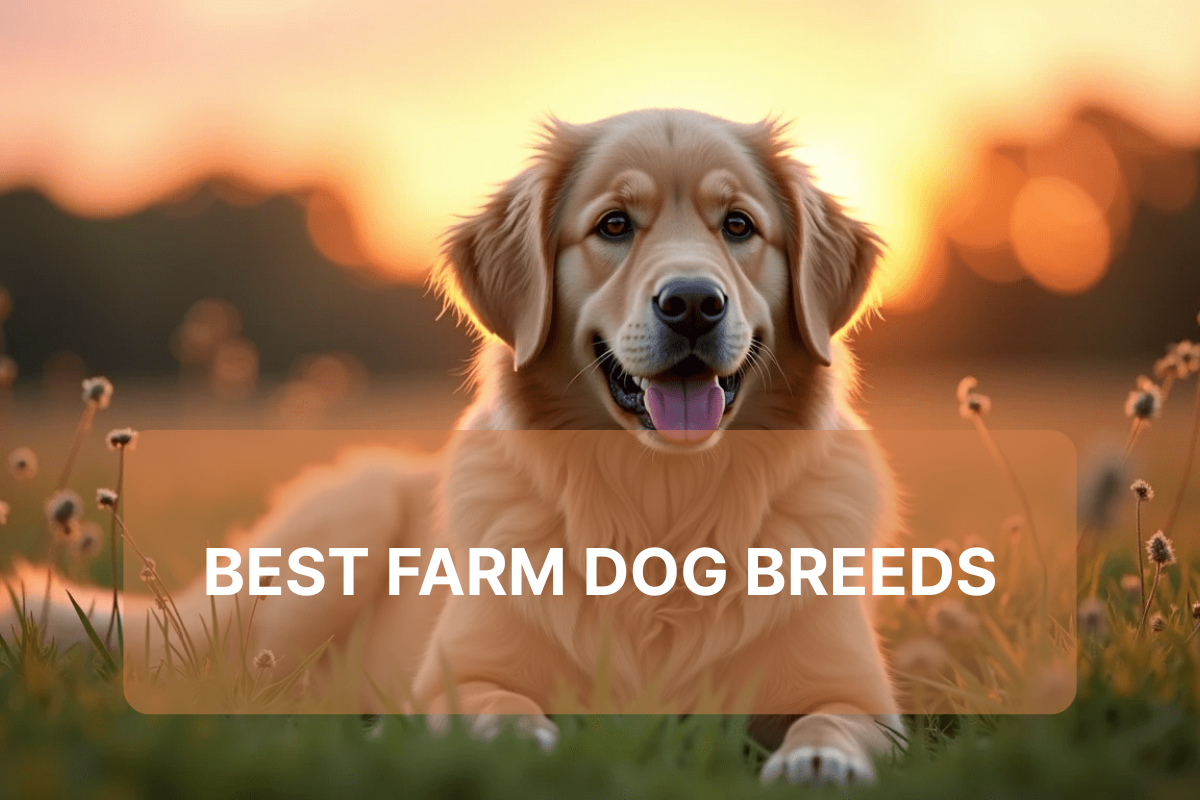Choosing the best farm dog breed is a big decision for anyone living on a farm or ranch. A good farm dog helps in many ways—from herding livestock to guarding property and even becoming a loyal companion. Not all dogs are fit for rural life, so it is important to understand which breeds are best suited for farm environments. Some breeds are natural workers with strong instincts, while others are better at protection or companionship.
Farm dogs must be strong, intelligent, and obedient. Most importantly, they must be able to handle large spaces and interact well with animals and people. In this blog post, we will explore what makes certain breeds ideal for farm life and help you choose the right one.
3 Key Points:
- Some dog breeds are natural herders.
- Others are better at guarding and protection.
- Farm dogs need strong work ethics and intelligence.
What Makes a Good Farm Dog?
A good farm dog is not just a pet; it’s a working partner. Dogs on farms need specific qualities that help them perform daily tasks. These include physical strength, stamina, obedience, and the ability to learn commands quickly. For example, Border Collies are known for their intelligence and quick learning. They are often used for herding sheep and other livestock. Their energy and brainpower make them ideal for busy farm life.
Apart from working skills, farm dogs should be calm around other animals. Farms have cows, chickens, horses, and more. A dog must not panic or chase them unless trained to do so. It should know the difference between play and work. Livestock Guardian Dogs (LGDs) like the Great Pyrenees are bred to stay with animals and protect them from predators like foxes and coyotes. That’s why many of the best farm dog breeds are chosen for their combination of working ability and calm temperament around other animals.
Reminder: Always consider your specific farm needs before choosing a dog.
How Do Herding Dogs Help on a Farm?
Herding dogs are specially trained to move animals from one place to another. They are often used for sheep, cows, or goats. These dogs must be fast, smart, and able to understand commands like “left,” “right,” and “stop.” Breeds like the Australian Shepherd and Border Collie are excellent examples. They can run for hours and still stay focused.
Herding dogs are not aggressive. Instead, they use body movement and eye contact to guide animals. Their job is to keep the herd together and avoid harm. They are very helpful during grazing or when animals need to be taken into barns. Farmers love these dogs for their speed and patience.
Training herding dogs is a process that starts young. They begin with basic obedience and then move on to herding drills. In the right hands, a trained herding dog can replace several workers on a large farm.
Note: Training a herding dog takes time but pays off greatly in productivity.
Which Breeds Are Best for Guarding the Farm?
While some dogs help herd, others guard the farm. Guard dogs are trained to protect livestock and property. They are strong, alert, and not afraid to bark or fight if danger comes. Good guard dog breeds include the Anatolian Shepherd, Great Pyrenees, and Akbash.
These dogs usually live outside and are trusted to roam freely around the farm. They learn which animals are part of the farm and which are threats. Unlike herding dogs, they don’t chase or control livestock. Instead, they bond with them and stay close, especially at night.
For example, the Great Pyrenees is known for being calm and loving with animals but brave against intruders. This breed often works in pairs to cover more ground.
Guard dogs also need socialization, so they don’t become aggressive without cause. They should be trained to understand real danger versus normal visitors or animals.
What Are the Top Breeds for Farm Life?
Let’s compare the most popular farm dog breeds and what makes each one special.
Comparison Table 1: Herding Breeds
| Breed | Key Skill | Temperament | Size |
|---|---|---|---|
| Border Collie | Herding livestock | Smart, Energetic | Medium |
| Australian Cattle Dog | Herding cattle | Brave, Active | Medium |
| Australian Shepherd | Herding sheep | Loyal, Intelligent | Medium |
Comparison Table 2: Guardian Breeds
| Breed | Guarding Skill | Temperament | Size |
|---|---|---|---|
| Great Pyrenees | Protects livestock | Calm, Brave | Large |
| Anatolian Shepherd | Deterrent to threats | Loyal, Protective | Large |
| Akbash | Watches and protects | Quiet, Watchful | Large |
Each of these dogs has its own strengths. The best choice depends on your farm needs. If you have lots of sheep, a Border Collie is a great choice. If you need to protect animals from wolves or strangers, go for the Great Pyrenees. mavuika.org
How Can You Train a Dog for Farm Work?
Training a farm dog starts with understanding its natural skills. For example, herding dogs already have the instinct to control movement. You just need to shape that instinct with commands. Start with simple commands like “sit,” “stay,” and “come.” Once these are mastered, move on to specific tasks like herding or guarding.
Consistency is key. Dogs learn best when they get the same message every time. Use rewards like treats or toys to reinforce good behavior. Training also includes exposure. Take the dog around the farm to meet animals, hear machines, and learn boundaries.
Guardian breeds train differently. They must learn to bond with the livestock they protect. Puppies are often raised with sheep or goats, so they learn to see them as part of the pack. These dogs don’t need strict commands, but must learn what is safe and what is not.
Training the best farm dog breeds can take weeks or even months, but the results are well worth the effort.. A trained farm dog is a lifelong helper. mavuika.org
Conclusion
Farm dogs are more than just pets; they are part of the team. The best farm dog breeds have unique strengths that help them fit into farm life. Whether herding, guarding, or offering companionship, these dogs improve safety and efficiency. Choosing the right breed depends on the type of farm and what tasks you need help with.
Dogs like the Border Collie, Great Pyrenees, and Australian Shepherd have proven themselves over and over as reliable and hardworking companions. With proper training, socialization, and care, your farm dog will be a loyal worker for years to come.
FAQ’s
1. What is the best overall farm dog breed?
The Border Collie is often considered the best all-around farm dog due to its intelligence and herding skills.
2. Can farm dogs live indoors?
Some farm dogs can live indoors part-time, but generally need lots of space to work and roam.
3. Are guardian dogs good with kids?
Yes, most livestock guardian dogs like the Great Pyrenees are gentle with children if socialized early.
4. How much exercise do farm dogs need?
Farm dogs need daily physical activity and mental stimulation to stay healthy and happy.
5. Can you train an adult dog for farm life?
Yes, but it may take more time and patience compared to training a puppy. Early socialization is always best.




